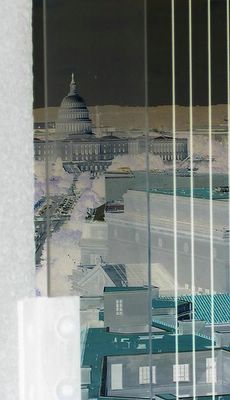QUOTATIONS: John Dewey Puts It Well
WHENEVER I HEAR THE NAME Dewey and the University of Michigan, I think of Thomas E. Dewey (of Dewey Beats Truman fame), who once wrote for my old college newspaper, The Michigan Daily back in the 1920s.
Thomas E. Dewey wrote an opera review for the Dec. 10, 1921, Daily:
The dancing this year is the best ever shown in an opera, without question, with the Dagger Dance in the last act as the most striking in a professional act of the show. The songs of Cyrus N. Tavares, '24, and Dawn Y. Tang, '24E, who, decked in native costume, opened the second act with the most unique scene of the evening. (via "Special to the Daily," Caddo Gap Press, 1990)
BUT WHEN I HEAR DEWEY, I should be thinking John Dewey (1859-1952), the noted American philosopher, whose work is featured in "Writing Ann Arbor: A Literary Anthology" ... along with yours truly. I was reading his selected piece in the anthology (A College Course: What Should I Expect From It? -- via "The Early Works, 1882-1898; Carbondale and Edwardsville: Southern Illinois University Press, 1969) and thought one part of it was particularly relevant to the transient nature of Washington, D.C.
Some have said that to a recent undergraduate, Washington presents an obvious extension of the college life, except in a more urban setting … and for those who have a political science or related degree, a life that is more isolated and partisan.
Instead of "college," replace it with "Washington":
But the voyage one takes in entering college life is a voyage to a far port, and through many countries foreign in space, in time, in manner of speech and thought. If such traveling of the spirit does not remove the narrow and small cast of one's opinion and methods it is failing its aim. ... Let a man learn on this journey to lay aside the suit, the habit, of mental clothes woven and cut for him in his native village, and to don the foreign costumes. If he be called to wear his old suit, he will wear it the more easily and naturally for knowing something of the fashion of other men's garments.From my time on Capitol Hill, “knowing something of the fashion of other men’s garments” isn’t looked too highly upon. The translation is from another generation, but the overall message, more or less, still rings true.
And when one gives up his provincialism, let him make the renunciation complete. Partisanship, of whatever sort, or however disguised, is but provincialism of a larger growth and more imposing mien.
>> John Dewey [Wikipedia]
>> "So Young a Man ... So Old a Head" [Michigan Today]



0 Comments:
Post a Comment
<< Home